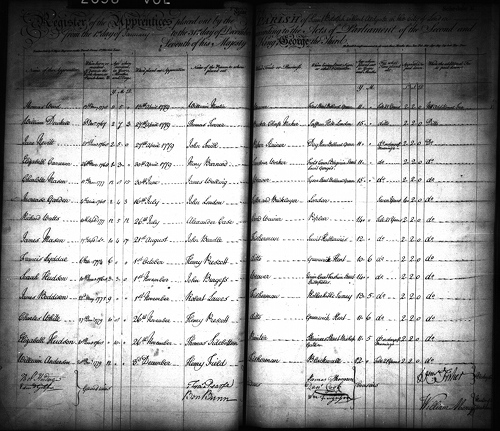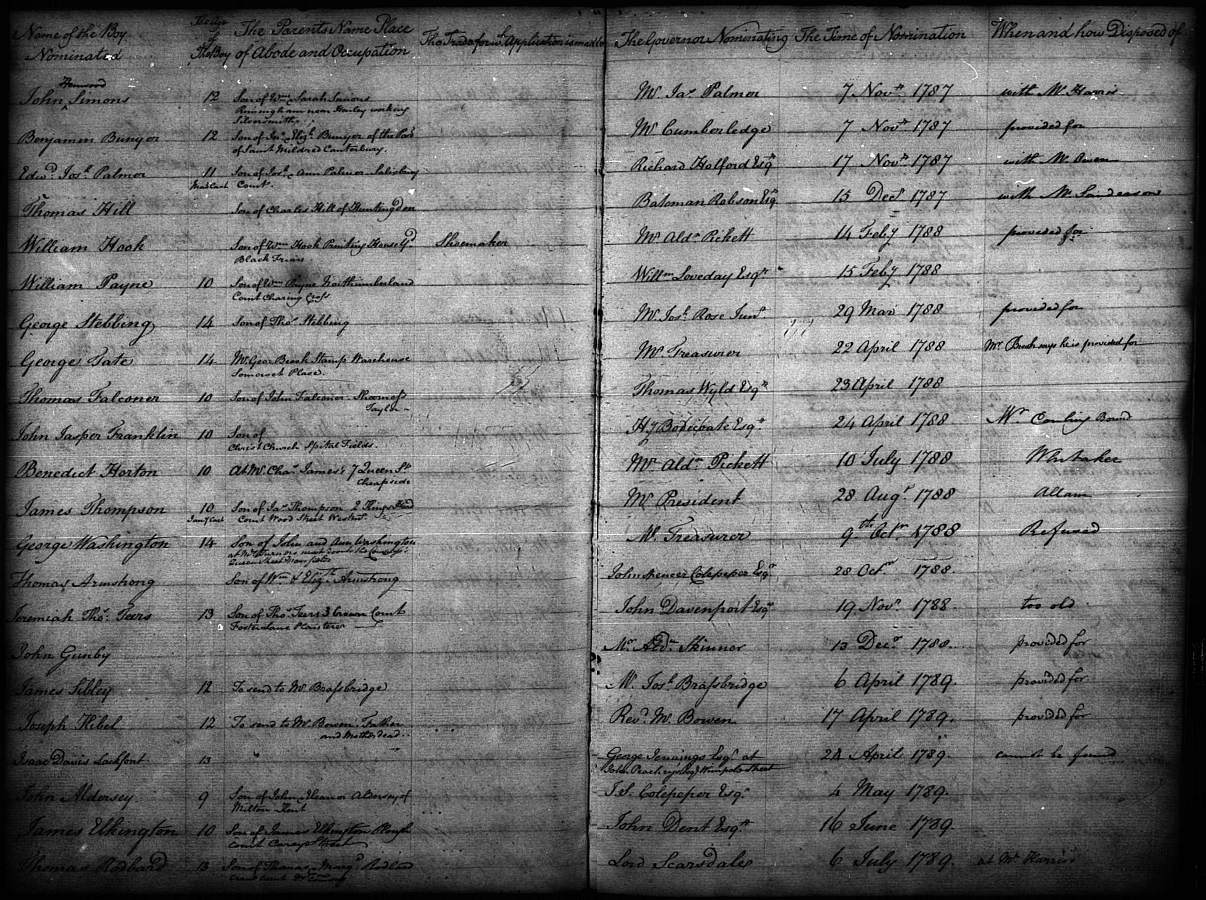Registers of Pauper and Bridewell Apprentices (RA)
 London Metropolitan Archives, St Botolph Aldgate, Register of Apprentices, 1777-1805, London Metropolitan Archives, Ms 2658, LL ref: GLBARA107010009.
London Metropolitan Archives, St Botolph Aldgate, Register of Apprentices, 1777-1805, London Metropolitan Archives, Ms 2658, LL ref: GLBARA107010009.
Introduction
An apprenticeship formed a legally binding arrangement for the education and training of a child (usually from around the age of twelve or thirteen but sometimes from as young as seven) in the home or workshop of a master or mistress. Even in the case of a parish apprenticeship (at least from 1692), a sum of money was normally paid to the master, and in exchange they agreed to train the child in their trade or profession, and to supply them with appropriate food, clothing and lodging for the duration of the apprenticeship. An Apprenticeship Indenture (IA) was generally created and signed by the principals and a Justice of the Peace in order to execute a legally binding agreement. The Registers of Apprentices reproduced on this website are of two sorts: first, registers of pauper apprenticeships, created under the auspices of Jonas Hanway's Act for the Better Regulation of the Parish Poor Children from 1767; and second, a register of Bridewell apprentices, created for internal use and beginning in 1784.
Registers of Pauper Apprentices
Building on his charitable work in establishing the Marine Society, and helping to manage the Foundling Hospital, Jonas Hanway actively campaigned for and was instrumental in formulating two acts of parliament legislating for the creation of registers of children in parish care. As part of this campaign the second of these two Acts, the 1767 Act for the better Regulation of the Parish Poor Children,1 stipulated that registers of parish apprentices be kept by most London parishes. The act also significantly changed the terms under which parish children were apprenticed.
Until 1767 a parish apprenticeship normally lasted until the age of twenty-four for boys and twenty-one or marriage for girls. Hanway's Act lowered the length of time a parish child could be apprenticed to a maximum of seven years, or until the age of twenty-one for both boys and girls. It also stipulated that the minimum fee that should be paid to the master or mistress should be at least £4 2s, and that this fee should be paid in two instalments - the second half being paid three years into the apprenticeship. This provision was designed to eliminate abuses by masters who misused or abandoned their apprentices, having appropriated the initial fee.
The Registers of Pauper Apprentices reproduced here were created in accordance with schedule E of this act, which prescribes the precise form of the registers to be kept by the parishes, and of the information to be reported annually to the Company of Parish Clerks. This act also stipulated the size ("Royal Paper", 25" x 20") and layout of each register, and mandated that they should be approved annually by the vestry.
See the Registers of Poor Children (RC) for registers created according to schedule B of the same Act.
Schedule E, Register of the Apprentices placed out by the Parish, lists the following headings:
- Name of apprentice
- When born or received by the parish, and if born in the workhouse
- Age in years, months and days
- When placed apprentice
- Name of master or mistress
- To what trade or business
- Where - including street, sign or other distinction
- Age when apprenticed in years and months
- For what period
- Apprenticeship fee
- When additional fee is paid
These registers take the shape of a table spread across two pages, with the child's name in the left hand column. Because they are difficult to read in transcribed form, you are advised to consult the associated original page images.
 Bridewell and Bethlem, Apprentice records, 1784-1796, London Metropolitan Archives, Ms 33127A-1, LL ref: GLBRRA200010007&8.
Bridewell and Bethlem, Apprentice records, 1784-1796, London Metropolitan Archives, Ms 33127A-1, LL ref: GLBRRA200010007&8.
Register of Bridewell Apprentices
Besides acting as a house of correction, Bridewell Hospital also acted as an industrial school, with apprentice (or arts) masters employed to train up boys from London in a range of occupations. The Bridewell Apprenticeship Registers survive from 1784, and were created at a time when concerns about adolescence and apprenticeship were at the forefront of public debate. This register includes not just boys formally apprenticed, but also those who were nominated by a governor of the hospital, but were either refused, or provided for in some other way. While the register provides a helpful census of the apprentices who were trained in Bridewell, other records on this website provide information about their (mis)behaviour, the conditions they experienced, and the governors' decisions about their fates, most notably Apprenticeship Records (IA), which include a log of disciplinary cases, Bridewell General Committee Minute Books (MB), in particular the Prison Committee Minute Books, and the Minutes of the Court of Governors (MG).
The Bridewell register contains the following information:
- Name of the boy
- The age
- The parents name, place
- The trade for which Application is made
- The governor nominating
- The time of nomination
- When and how disposed of
These registers take the shape of a table spread across two pages, with the child's name in the left hand column. Because they are difficult to read in transcribed form, you are advised to consult the associated original page images.
Introductory Reading
- Hindle, Steve. "Waste" Children? Pauper Apprenticeship Under the Elizabethan Poor Laws, c. 1598-1697. In Lane, Penelope; Raven, Neil and Snell, Keith, eds, Women, Work and Wages in England, 1600-1850. Woodbridge, 2004.
- Honeyman, Katrina. Child Workers in England, 1780-1820: Parish Apprentices and the Making of the Early Industrial Labour Force. Aldershot, 2007.
- Lane, Joan. Apprenticeship in England, 1600-1914. 1996.
- Levene, Alysa. "Honesty, Sobriety and Diligence": Master-Apprentice Relations in Eighteenth- and Nineteenth-Century England. Social History, 33:2 (2008), pp. 183-200.
- Taylor, James Stephen. Jonas Hanway, Founder of the Marine Society: Charity and Policy in Eighteenth-Century England. London and Berkeley, 1985, ch.8.
Online Resources
For further reading on this subject see the sections of the London Lives bibliography related to Hospitals, Guilds and Apprenticeship, and Parish Records.
Documents Included on this Website
- St Botolph Aldgate, Register of Apprentices, 1777-1805, London Metropolitan Archives, Ms. 2658, LL ref: GLBARA10701 Tagging Level: Aa
- St Botolph Aldgate, Register of Poor Children, 1772-99, London Metropolitan Archives, Ms. 2660, LL ref: GLBARA10702, Tagging Level: C
- Bridewell and Bethlem, Apprentice Records, 1784-96, London Metropolitan Archives, Ms. 33147A-1, LL ref: GLBRRA20001, Tagging Level: B
Footnotes
1 7 George III c. 39 ⇑